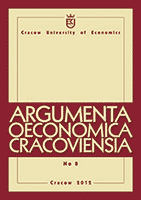Political Reforms Based on a Human Capital Research Programme
Political Reforms Based on a Human Capital Research Programme
Author(s): Mieczysław DobijaSubject(s): Economy
Published by: Wydawnictwo Uniwersytetu Ekonomicznego w Krakowie
Keywords: capital; human capital; minimum wage; constant pay; labour productivity; budget deficit
Summary/Abstract: The aim of this paper is to introduce a political programme of reforms stemming from human capital research conducted over more than 15 years. Recognition of the abstract nature of capital has made alternative research possible. Human capital ‒ the human ability to do work ‒ is under the authority of all fundamental laws established in respect of the general notion of capital as spontaneous, and possessing random diffusion and limited growth. The phenomenon of human capital’s natural dispersion is a starting point for the theory of the minimum wage, which ought to be sufficient to counterbalance the natural thinning out of the initial human capital of an employee. The essence of the money economy reveals an abstract triad: capital – labour – money, where capital is the ability to do work, labour is the transfer of capital to products, and wages receivable correctly defines money earned by employees. The only proper money creating process is through labour. Money is a certification of work done; therefore labour is always self-financing. Using this theoretical framework, governments can eliminate budget deficits, and reduce direct taxes and unemployment while avoiding inflation. If the compensation paid in the public sector comes from the funds collected by taxation, then the economy works as a scarcity machine. In the reshaped economic system, the Central Bank directly transfers salaries earned by the public sector employees to their bank accounts. The budgets are then balanced, the direct taxes are limited, and the public debt no longer grows. The modern equation of exchange involves labour productivity as a fundamental economic ratio.
Journal: Argumenta Oeconomica Cracoviensia
- Issue Year: 2012
- Issue No: 08
- Page Range: 9-29
- Page Count: 21
- Language: English

